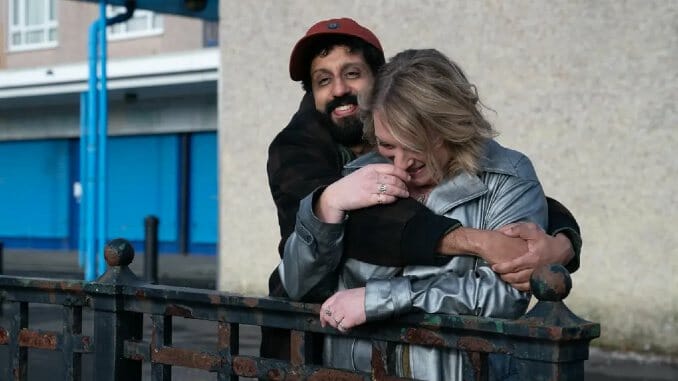British Romance Ali & Ava‘s Overstuffed Mess Is Part of Its Honest Appeal

Even before they meet, Ali (Adeel Akhtar) and Ava’s (Claire Rushbrook) lives are full of complications. Although Ali separated from his wife (Ellora Torchia) months earlier, the two of them still live in the same house (“like flatmates”), while she finishes studying for a degree. They’ve been maintaining their marriage charade in front of his large family, not wanting to invoke anyone’s ire or disappointment.
As for Ava—a teacher’s aide, mother of four grown children and grandmother to five— it’s rare she gets a moment to herself. She’s still dealing with the emotional fallout from her last relationship, with a man who abused her relentlessly. Though he’s dead now, he’s left an uneasy legacy with their son Callum (Shaun Thomas), who seems to have half Ava’s sweetness, and half his father’s brutality. He’s not pleased about her connecting with a new man, and not afraid to express that displeasure—at one point, with a sword.
With so much going on for both of them, neither is actively on the look out for a partner. And yet from the moment they meet—as Ali offers Ava a lift home from school on a biblically rainy day—there’s an undeniable spark. Ali & Ava follows the pair as they explore whether that spark is strong enough to stand up to the prevailing winds of the rest of their lives.
Writer/director Clio Barnard’s third feature is packed with weighty material; in addition to the issues already mentioned, racism, mental illness and the specter of lost dreams all have their parts to play. Unfortunately, the film only runs a whisker over 90 minutes, which is far too lean a runtime to support all that Barnard is trying to cover. Several of the subplots are substantial enough to power a whole narrative, but crammed together, serving as background noise to a love story, few get the requisite space to breathe. Callum suffers the worst for this—Thomas’ performance hits the perfect midpoint between bruised vulnerability and seething violence, and his character raises so many questions around the intergenerational trauma of domestic abuse, learned racism and toxic masculinity, to have his array of problems “solved” so neatly casts a frustrating pall over an otherwise emotionally honest movie.
-

-

-

-

-

-

-

-

-

-

-

-

-

-

-

-

-

-

-

-

-

-

-

-

-

-

-

-

-

-

-

-

-

-

-

-

-

-

-

-








































